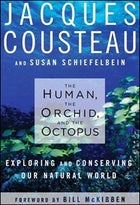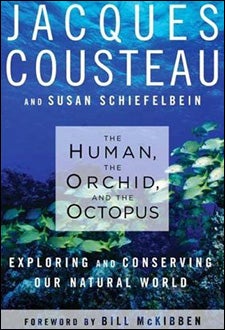JACQUES COUSTEAU has been dead ten years, but that, it seems, hasn’t stopped him from releasing another book. He began his latest, The Human, the Orchid, and the Octopus: Exploring and Conserving Our Natural World (Bloomsbury USA, $26), co-written with National Magazine Award winner Susan Schiefelbein, back in the eighties, but the pair didn’t put the finishing touches on it till just before his 1997 death. (An unauthorized version was published in French, but this is the first time it has appeared in English.) More “manifesto,” as the publisher describes the work, than whopping autobiography, the memoir doesn’t reveal much new about the red-stocking-capped explorer’s life aquatic that hasn’t been said in his previous 75 books and countless documentaries. But it’s still full of both untold and already told undersea adventures (remember the time Jacques and a mate were attacked by that behemoth longimanus shark with the “long flippers like the wings of a fighter plane”?).
Want It? Get it.
Buyfrom amazon.com.
Jacques Cousteau
 The Human, the Orchid, and the Octopus
The Human, the Orchid, and the Octopus
At times, especially in the book’s plodding middle section, the joint writing is too apparent and the voice lacks the brio we associate with the man. But the opening and closing chapters are remarkable and moving, and Cousteau’s familiar themesÔÇöthat life originated from the sea, and, thus, we must protect the oceans for our children and grandchildrenÔÇöhave gained new urgency. Since Cousteau died, Schiefelbein writes in the epilogue, the world’s condition has gone “critical.” About 20 percent of the oceans’ fisheries have collapsed, she notes, and we’ve lost about 90 percent of the earth’s carnivorous fish, including cod and tuna. In a way, the book’s poetic title refers to that decline: Of the most sophisticated plants, invertebrates, and vertebrates on the planet, only humans, Cousteau believes, seem hell-bent on self-destruction. “Our abuse, not just of other human beings but of the natural world as well,” he writes, “makes one wonder if the complex human brain is itself a lethal mutation.”
Vanishing Worlds
For the past two years, KenyaÔÇôbased photojournalist Elizabeth L. Gilbert has explored some of the most remote regions of Africa in search of nearly extinct cultures. With more than 100 of her rich black-and-white portraits, Tribes of the Great Rift Valley (Abrams, $75) is a gorgeous tribute to the disappearing societies she encounteredÔÇöfrom the Basua Pygmies of Uganda, who camouflage themselves with vines and leaves in the lush Semliki Forest, to the Yao people of Malawi, shown here celebrating Jando, a circumcision ceremony and rite of passage for young men. ÔÇöChristina Erb
Lost in Transliteration
Jagshemash! Following the success of his blockbuster 2006 film, Borat Sagdiyev (a.k.a. British comic Sacha Baron Cohen) is back with a twofer travel guide. Borat: Touristic Guidings to Minor Nation of U.S. and A. (Flying Dolphin, $25) is an astute look at America’s cultural wonders, including details on our greatest cities (New York and “Londons”). Flip the book over to read Borat: Touristic Guidings to Glorious Nation of Kazakhstan, an intimate portrait of the fatherland “containings over half the photographs, maps, and writings ever produced” there. Both books promise to be as helpful as anything from Lonely Planet: When was the last time they offered good advice on getting your wife’s cage through customs?ÔÇöJason Daley
BY OUR CONTRIBUTORS
In one of World War II’s most grueling marches, 1,200 men from the U.S. Army’s 32nd Infantry Division trekked 130 miles through the jungles of Papua New Guinea to fight the Japanese. James Campbell retraced their steps in 2006 and wrote about his journey in ║┌┴¤│ď╣¤═° (“Chasing Ghosts,” May 2007). For the complete story, pick up his new book, The Ghost Mountain Boys: Their Epic March and the Terrifying Battle for New GuineaÔÇöThe Forgotten War of the South Pacific (Crown, $26). Environmental writer Bill McKibben takes on a more modern battle, urging all of us to defend the planet (and showing us how) in Fight Global Warming Now: The Handbook for Taking Action in Your Community. McKibben co-wrote the book with the Step It Up team, a New HampshireÔÇô based group of young global-warming activists he helped found in January 2007. And journalist Steve Friedman explores the personal demons that fuel more than a dozen champion athletes, from cyclists and runners to boxers and bowlers, in The Agony of Victory: When Winning Isn’t Enough (Arcade, $26). “Here,” he writes, “are men and women driven neither by the will to win nor by the love of competition but by an existential terror most can’t even acknowledgeÔÇöa burning need to prove themselves and all too often a corrosive certainty that they are beyond redemption.” ÔÇöDianna Delling


